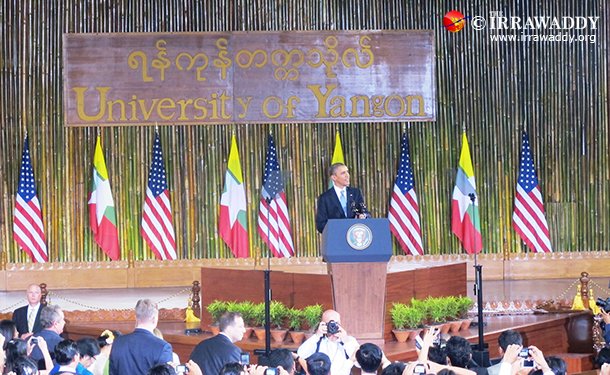WASHINGTON—The Rohingya community in the United States on Monday welcomed US President Barack Obama’s speech in Rangoon and, along with other Burmese communities and rights bodies, urged him not to ignore human rights issues in the country.
Rohingya Americans especially appreciated Obama’s remarks that “there’s no excuse for violence against innocent people, and the Rohingya hold within themselves the same dignity as you do, and I do.”
“The words in your speech today have cured the minds and thoughts of millions of Burmese infected by Gen Ne Win’s philosophy of Burman and Buddhism as the only superior race and religion,” said Nay San Oo, co-founder of the Free Rohingya Campaign.
But the Burma Task Force said that it was “shocked” at the timing of the president’s visit. “President Obama chose to visit when Burmese nationalist resentment and discrimination continue to target ethnic minorities, especially the Rohingya people, with thousands of homes destroyed in Burma’s Rakhine [Arakan] State, hundreds of people killed and tens of thousands displaced within the last month alone,” it said in a statement.
The recent communal violence between Arakanese Buddhists and Rohingya Muslims which has engulfed western Burma since June has so far killed at least 180 people, destroyed thousands of homes and displaced more than 110,000 people, according to official figures.
Signed by more than half-a-dozen rights bodies including the American Society for Muslim Advancement, Burmese Rohingya Association of North America, Interfaith Center of New York and Free Rohingya Campaign, the statement said the US should not ignore state-sponsored persecution of ethnic and religious minorities but instead energetically support rights for all peoples living in Burma.
“A viable US foreign policy must be based on human rights recognition and protection. Let there be no mistake,” said the statement. “In the president’s speech today, Mr. Obama spoke eloquently of democracy and human dignity and at last made reference to the Rohingya’s right to dignity and the need for reconciliation.
“However, his remarks about local insurgencies were unclear and leave us troubled about our government’s commitment to advocate for those most victimized,” added the statement. “We wonder: Will this administration follow up effectively to confront the pogrom against minorities and the exclusionary government policies that encourage division and hate in Burma?”
Obama’s trip marked the very first time that a sitting US president had visited Burma, and came less than two weeks after he defeated Republican rival Mitt Romney at the ballot box to win a second term in the White House.
Meanwhile, the Institute for Science and International Security (ISIS) welcomed Burma’s decision to sign “additional protocol” that would allow the International Atomic Energy Agency (IAEA) to more efficiently and effectively provide assurance regarding the absence of undeclared nuclear materials and activities in Burma.
“This latest move by Burma is extremely positive for its ongoing push for openness about the nuclear issue and for building confidence and transparency with the international community,” said a ISIS report authored by David Albright and Andrea Stricker.
“As part of the process of implementing the additional protocol, Burma should answer questions the IAEA has about any past nuclear activities and the procurement of sensitive equipment possibly used or intended for nuclear purposes.”
Burma’s former military junta had previously been accused of attempting to procure nuclear technology from North Korea.















